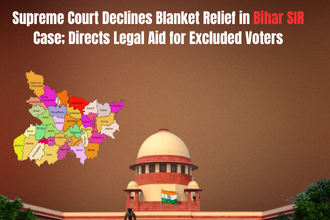In a significant judgment that reinforces the foundational principles of contract law, the Calcutta High Court has ruled that an arbitration clause contained in an incomplete and unfinalized Memorandum of Understanding (MOU) cannot be treated as enforceable. The verdict, delivered by Justice Shampa Sarkar, serves as an important precedent for contractual disputes, especially in cases where business negotiations are still in progress and agreements remain in draft form.
Case Overview: Greenbilt Industries Pvt. Ltd. v. A B Dinesh Concrete Pvt. Ltd.
- Case Title: M/s Greenbilt Industries Private Limited v. M/s A B Dinesh Concrete Private Limited
- Case Number: AP (COM) 421 of 2024
- Judgment Date: April 6, 2025
- Bench: Justice Shampa Sarkar, Calcutta High Court
Background of the Case
The case stems from a business transaction initiated in October 2020, wherein the respondent, A B Dinesh Concrete Pvt. Ltd., entered discussions with the petitioner, Greenbilt Industries Pvt. Ltd., regarding the sale and takeover of certain assets, including plant and machinery. The total consideration for the transaction was Rs. 21 crores, out of which Rs. 3 crores was paid in advance by the petitioner. This advance was subject to forfeiture in case of breach.
To formalize the transaction, a Memorandum of Understanding (MOU) dated February 9, 2022, was drafted. The MOU included an arbitration clause (Clause 12.3), which was later invoked by the petitioner after disputes arose. However, this MOU was never finalized or executed by the parties.
Core Legal Issue: Is an Arbitration Clause in an Incomplete MOU Enforceable?
The primary legal question before the Court was whether an arbitration clause found in a draft and incomplete MOU could be the basis for invoking arbitration under the Arbitration and Conciliation Act, 1996.
Petitioner’s Arguments
The petitioner made the following key submissions:
- The MOU dated December 7, 2020, was part of an ongoing business arrangement and not the final word on the transaction.
- The exchange of emails between the parties constituted a valid acceptance of terms, including the arbitration clause, under Section 7(4)(b) of the Arbitration Act.
- Clause 12.3 of the MOU, which included the arbitration provision, was binding on both parties.
- Allegations of fraud or misrepresentation were also arbitrable and could be resolved through the appointed arbitrator.
Respondent’s Defense
The respondent, however, argued that:
- The MOU was never formally executed and had multiple blank fields.
- Crucial elements like loan details, payment structure, takeover terms, and signatory authentication were missing.
- The demand letter dated September 14, 2023, did not even mention the arbitration clause—indicating that the petitioner never considered the clause enforceable at that stage.
- Since the entire cause of action arose in Odisha and Raipur (Chhattisgarh), the Calcutta High Court lacked territorial jurisdiction.
Court’s Observations and Judgment
Justice Shampa Sarkar examined the nature and content of the MOU, especially its arbitration clause. The Court concluded:
“The alleged MOU of February 9, 2022, remained in a draft form, which was incomplete. There were no further documents which would show that the terms had been finalized.”
Key points from the Court’s findings include:
- The MOU was never executed, and vital commercial information was missing.
- The arbitration clause was not independently agreed upon through any separate communication or agreement.
- The demand letter sent by the petitioner made no mention of arbitration, further suggesting a lack of intent to arbitrate at the time of the dispute.
- On the *issue of jurisdiction, the Court noted that all events occurred outside of West Bengal, and therefore, the Calcutta High Court had *no territorial jurisdiction.
Conclusion of the Ruling
The Court ultimately dismissed the petition under Section 11 of the Arbitration and Conciliation Act, 1996, ruling that:
- An arbitration clause within an incomplete and unfinalized MOU cannot be the basis for appointing an arbitrator.
- The petitioner’s attempt to rely on an unenforceable agreement to initiate arbitration was legally untenable.
This case reaffirms the critical principle that arbitration clauses must stem from a legally binding and concluded contract.
Key Legal Takeaways
- Arbitration Requires Final Agreement: An arbitration clause cannot stand alone; it must be embedded in a finalized, executed, and legally binding agreement.
- Incomplete MOUs Are Not Contracts: Drafts with blank fields or unexecuted documents will not qualify as enforceable under Indian contract law.
- Territorial Jurisdiction Matters: Courts will scrutinize where the cause of action arose before assuming jurisdiction under the Arbitration Act.
- Conduct of the Parties Counts: Lack of reference to arbitration in initial dispute communications can undermine subsequent claims to enforce arbitration clauses.
Implications for Businesses and Legal Practitioners
This ruling has strong implications for both business entities and legal professionals:
- Companies must ensure MOUs and commercial contracts are properly executed and leave no essential terms incomplete.
- Legal advisors must verify that arbitration clauses are part of a legally enforceable agreement before initiating or defending arbitration proceedings.
- Jurisdictional issues should be thoroughly examined at the outset to avoid dismissal based on technical grounds.
Final Thoughts
The judgment in Greenbilt Industries Pvt. Ltd. v. A B Dinesh Concrete Pvt. Ltd. highlights the importance of precision in contract drafting, particularly in relation to dispute resolution clauses. Arbitration, while efficient and cost-effective, still demands a valid legal foundation—an enforceable agreement. Businesses seeking to protect their interests must treat draft agreements and MOUs with the same rigor as final contracts.


